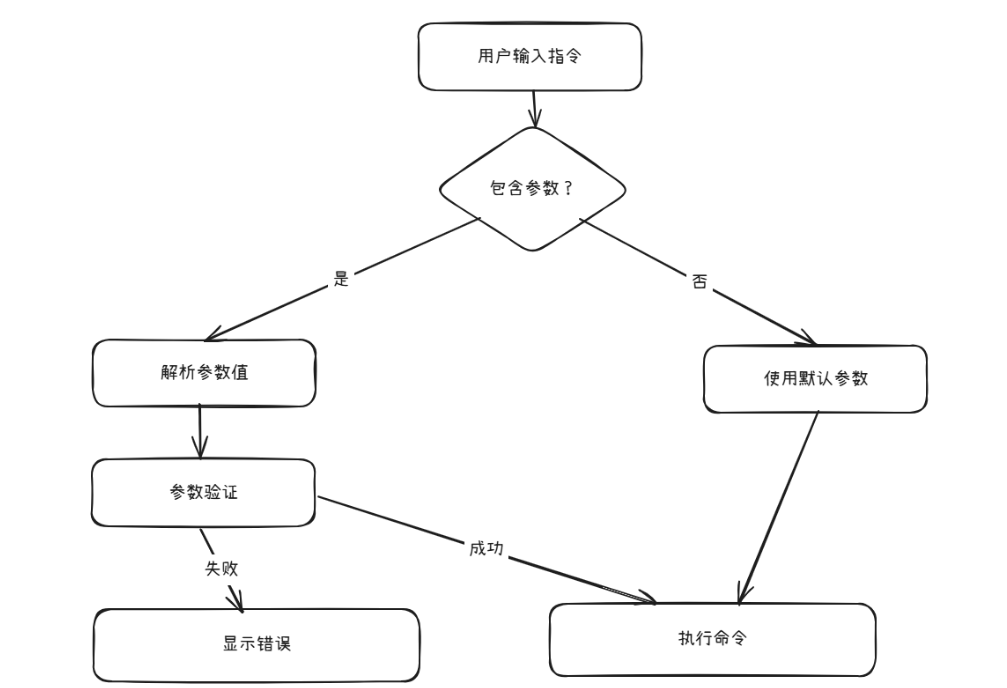【项目开发】Cobra 命令与参数
Satori2Core 2025/6/15 Go项目开发GoCobra环境搭建
# Cobra 命令与参数
# 1. 基本认识
在 Cobra 中,命令代表一个可执行的操作(如 create),而参数(Flags)则是命令的配置选项(如 -n 或 --name)。参数可以修改命令的行为,实现动态功能调整。
比如如果我们的项目有多个版本的配置文件,则可以通过参数来基于哪一个配置文件启动服务。
# 1.1 参数是什么?
- 本质:命令的可选配置项
- 作用:调整命令行为,传递额外信息
- 特点:
- 以 - 或 -- 开头(如 -n,--name)
- 不属于命令名的一部分
- 不影响命令层级结构
# 1.2 为什么需要参数?
场景示例:文件复制工具
基础命令:copy
但当需要实现:
- 覆盖已存在文件时 → 需要 --force
- 保留文件属性时 → 需要 --preserve
- 仅复制更新文件时 → 需要 --update
# 无参数版本(功能有限)
copy source.txt target.txt
# 带参数版本(功能强大)
copy --force --update source.txt target.txt
# 2. 参数类型与解析方法认识
| 类型 | 作用域 | 创建方法 | 使用场景 |
|---|---|---|---|
| 本地参数 | 仅当前命令 | Flags() | 命令特有的配置(如 create -n file.txt) |
| 持久参数 | 该命令及其所有子命令 | PersistentFlags() | 全局配置(如 --verbose 调试模式) |
【解析方法的使用格式】
cmd.Flags().类型P(长名称, 短名称, 默认值, 帮助文本)- 参数说明:
StringP: - P代表支持短/长两种形式"text"-> 长参数:--text"t"-> 短参数:-t"Hello"-> 默认值(用户不指定时使用)
# 3. 命令参数的简单认识与使用
# 3.1 示例代码
func main() {
// 根命令
rootCmd := &cobra.Command{
Use: "repeat",
Short: "重复输出文本",
// 参数绑定后自动注入
Run: func(cmd *cobra.Command, args []string) {
// 获取参数值(从 cmd.Flags())
text, _ := cmd.Flags().GetString("text")
count, _ := cmd.Flags().GetInt("count")
// 核心业务逻辑
result := strings.Repeat(text+" ", count)
fmt.Println("输出", strings.TrimSpace(result))
},
}
// 添加文本参数(支持长/短两种模式)
rootCmd.Flags().StringP("text", "t", "Hello", "要重复的文本")
// 添加次数参数
rootCmd.Flags().IntP("count", "c", 3, "重复次数")
rootCmd.Execute()
}
# 3.2 使用演示
# 示例:开始 -----------------------------------------------------------------------------
➜ cobra-flags git:(learn/cobra) ✗ go build -o repeat # 编译
➜ cobra-flags git:(learn/cobra) ✗ ./repeat # 使用默认参数(默认文本:Hello;默认重复次数:3)
输出 Hello Hello Hello
➜ cobra-flags git:(learn/cobra) ✗ ./repeat --text=World # 指定文本
输出 World World World
➜ cobra-flags git:(learn/cobra) ✗ ./repeat -t Golang -c 2 # 混合使用短参数
输出 Golang Golang
➜ cobra-flags git:(learn/cobra) ✗ ./repeat -h # 帮助信息(自动包含参数说明)
重复输出文本
Usage:
repeat [flags]
Flags:
-c, --count int 重复次数 (default 3)
-h, --help help for repeat
-t, --text string 要重复的文本 (default "Hello")
➜ cobra-flags git:(learn/cobra) ✗
# 示例:结束 -----------------------------------------------------------------------------
# 4. 参数类型及使用示例
# 4.1 多类型参数使用
| 类型 | 创建方法 | 获取方法 | 用途示例 |
|---|---|---|---|
| 字符串 | StringP() | GetString() | 文件名、文本内容 |
| 整数 | IntP() | GetInt() | 重复次数、端口号 |
| 布尔值 | BoolP() | GetBool() | 开关选项(true/false) |
| 时间 | DurationP() | GetDuration() | 超时设置 |
| 字符串数组 | StringSliceP() | GetStringSlice() | 文件列表 |
# 4.2 示例:增强版文件检测工具
【代码示例】
func main() {
rootCmd := &cobra.Command{
Use: "filecheck",
Short: "文件检查工具",
Run: func(cmd *cobra.Command, args []string) {
// 获取所有参数
path, _ := cmd.Flags().GetString("path")
recursive, _ := cmd.Flags().GetBool("recursive") // 是否启用递归模式
minSize, _ := cmd.Flags().GetInt64("min-size")
exts, _ := cmd.Flags().GetStringSlice("ext")
fmt.Printf("检查路径: %s\n", path)
fmt.Printf("递归模式: %v\n", recursive)
fmt.Printf("最小尺寸: %d字节\n", minSize)
fmt.Printf("扩展名过滤: %v\n", exts)
},
}
// 支持不同数据类型
rootCmd.Flags().StringP("path", "p", ".", "检查路径")
rootCmd.Flags().BoolP("recursive", "r", false, "递归检查")
rootCmd.Flags().Int64P("min-size", "s", 1024, "最小文件大小(字节)")
rootCmd.Flags().StringSliceP("ext", "e", []string{}, "按扩展名过滤(可多个)")
rootCmd.Execute()
}
【使用示例】
# 示例:开始 -----------------------------------------------------------------------------
➜ filecheck git:(learn/cobra) ✗ go build -o filecheck
➜ filecheck git:(learn/cobra) ✗ ./filecheck -p /data -r -s 2048 -e jpg -e png
检查路径: /data
递归模式: true
最小尺寸: 2048字节
扩展名过滤: [jpg png]
➜ filecheck git:(learn/cobra) ✗
# 示例:结束 -----------------------------------------------------------------------------
# 5. 关键参数功能 —— 特殊情景
# 5.1 必填参数
先添加参数,再对这个参数标记为必填!(不指定即非必填)
关键方法:
MarkFlagFlagRequired("需要必填的字段名")
// 添加参数后标记为:必填
func main() {
rootCmd := &cobra.Command{
Use: "sptest",
Short: "特殊场景测试",
Run: func(cmd *cobra.Command, args []string) {
username, _ := cmd.Flags().GetString("username")
fmt.Printf("用户输入的用户名是:%s\n", username)
},
}
rootCmd.Flags().StringP("username", "u", "匿名", "用户名(必须)")
rootCmd.MarkFlagRequired("username") // 关键方法
rootCmd.Execute()
}
// 效果:
// 当用户忘记输入时自动报错
// Error: required flag "username" not set
# 5.2 参数关联验证
- 参数关联验证,即有的参数需要依赖于其他参数是合法的!
- 关键方法:
PreRun
func main() {
rootCmd := &cobra.Command{
Use: "sptest",
Short: "特殊场景测试",
Run: func(cmd *cobra.Command, args []string) {
output, _ := cmd.Flags().GetString("output")
theme, _ := cmd.Flags().GetString("theme")
fmt.Println("输出:", output)
fmt.Println("主题:", theme)
},
}
rootCmd.Flags().StringP("output", "o", "text", "输出格式")
rootCmd.Flags().StringP("theme", "t", "light", "颜色主题")
// 参数验证(定义在Run函数前)
rootCmd.PreRun = func(cmd *cobra.Command, args []string) {
output, _ := cmd.Flags().GetString("output")
if output != "text" && output != "json" {
log.Fatal("输出格式必须是text或json")
}
}
rootCmd.Execute()
}
/*
测试:
➜ special git:(learn/cobra) ✗ go build -o sptest
➜ special git:(learn/cobra) ✗ ./sptest -o png -t night
2025/06/22 22:28:22 输出格式必须是text或json
*/
# 6. 参数使用流程图

